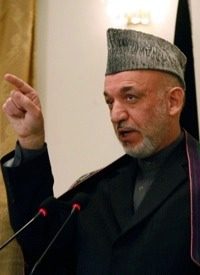
Delivering his acceptance speech at a November 3 press conference, the day after Afghanistan’s Independent Electoral Commission (IEC) declared him the winner of the country’s disputed election, President Hamid Karzai issued an appeal to “to bring peace to this soil” and said that Afghans should “ask our Taliban brothers and others to return and embrace their own land.”
Iranian-based Press TV reported that in his speech, Karzai also promised to uproot corruption. "Afghanistan has been defamed by corruption. Our government has been defamed by corruption," Karzai told a press conference. "We will strive, by any means possible, to eradicate this stain," he vowed.
The New York Times provided a translation of Karzai’s speech, part of which was delivered in Pashto, one of the two official languages of Afghanistan and Karzai’s native tongue. Karzai stated:
We will try as soon as possible to bring peace to this soil, for ultimate peace in all over Afghanistan.
And ask our Taliban brothers and others to return to embrace of their own land, in this way we will demand help of international community. In the region, with neighboring countries have good and sincere ties and will strengthen more, also with world and particularly with America, a strategic relationship will be more advanced. It will be possible when all Afghans with one voice and hand are integrated, however, our government will be the government of unity and representatives of all Afghans. National unity will be the aim of this government.
A Reuters news commentary on Karzai’s address noted that Karzai’s prior calls for talks with Mullah Mohammad Omar, the former head of the Taliban regime, have so far been snubbed and that negotiations with other “moderate” Taliban factions — that are said to be motivated by local disputes and money rather than ideology — have also failed to bring significant defections. Despite Karzai’s overture towards some Taliban leaders, an asiaone.com report from AFP noted that the Taliban, in response, derided Karzai as a "puppet president" and accused Western powers of deciding to cancel Afghanistan’s election run-off.
"The cancellation of the second round of the election showed that decisions on Afghanistan are made in Washington and London, while the announcements are made in Kabul," the report quoted a Taliban statement. "What is astonishing is two weeks ago they were arguing that the puppet president Hamid Karzai was involved in electoral fraud … but now he is elected as president based on those same fraudulent votes, Washington and London immediately send their congratulations."
The Taliban statement was also critical of the UN role in monitoring Afghanistan’s presidential election, stating: "How and based on what principles will the United Nations consider this a legal administration now that the so-called ‘war on terror’ and ‘democracy’ have been shown to be empty slogans.”
A report from PressTV noted that the Taliban have condemned Karzai’s reelection as a farce and have vowed to continue its fight to drive foreign forces out of Afghanistan.
And while President Karzai may be extending an olive branch to the Taliban, officials in India seem to have a different view of the network of militants who are allied with al-Qaeda terrorists. In a message sent to Karzai on November 3 congratulating him on his reelection, India’s external affairs ministry encouraged the world “to stand steadfast against the challenge posed by the Al Qaeda and the Taliban, which threatens the stability of Afghanistan and that of the world as a whole.” The report noted that India supported the Hamid Karzai government during its first term by pledging over $1.2 billion in reconstruction aid for Afghanistan.
Let’s recap what has happened in Afghanistan since the United States and its NATO allies first sent troops there in 2001, in response to the September 11 attacks:
- The United States launched Operation Enduring Freedom, a military campaign, to destroy the al-Qaeda terrorist training camps inside Afghanistan, where the Taliban government had provided sanctuary for the terrorists.
- Anti-Taliban militias affiliated with the Northern Alliance, supported by U.S. air strikes against Taliban and al-Qaeda positions, captured Kabul and overthrew the Taliban.
- Shortly after the ouster of the Taliban, alliance leaders who had been in exile during Taliban rule met in Bonn, Germany, in December 2001 and adopted the Bonn Agreement, which led to the installation of Karzai as President, a position that was confirmed by a presidential election in 2004.
- An AP report in the Los Angeles Times for November 3 noted: “As of Tuesday, Nov. 3, 2009, at least 833 members of the U.S. military had died in Afghanistan, Pakistan and Uzbekistan as a result of the U.S. invasion of Afghanistan in late 2001, according to the Defense Department.”
Supposedly, the purpose of sending our troops to Afghanistan (later stretched beyond credible belief to Iraq) was to put the terrorists responsible for the attacks of September 11 out of business. This, obviously, has not been accomplished.
Now, our leading "ally" in the region, whose government the United States and NATO have supported through thick and thin, proposes that Afghans should “ask our Taliban brothers and others to return and embrace their own land.”
Can someone explain what those 833 Americans died for?
Photo: AP Images
?



